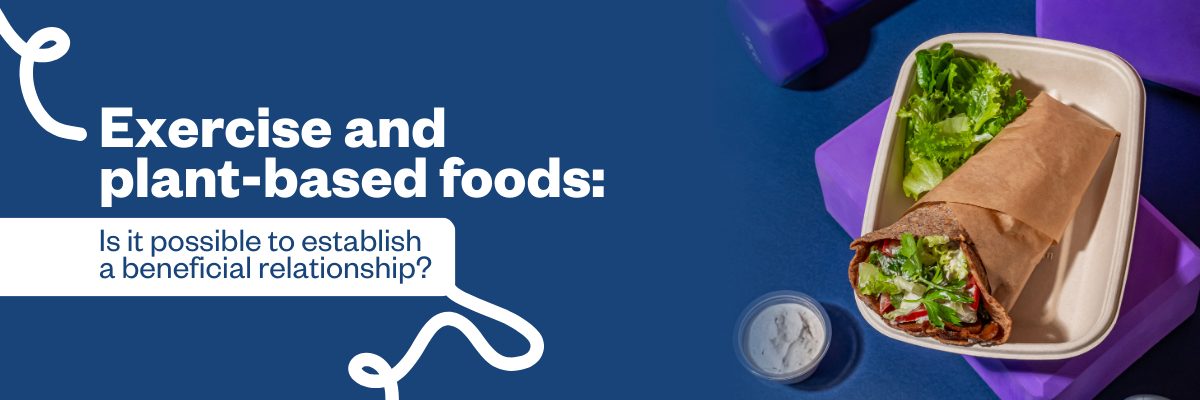Exercise and nutrition go hand-in-hand when it comes to achieving optimal health and fitness results. As plant-based diets gain popularity, many fitness enthusiasts are wondering: Can a plant-based diet support intense exercise and athletic performance?
The answer is a resounding yes.
Not only is a plant-based diet suitable for active individuals, but it can also offer distinct benefits that improve overall athletic performance and recovery.
In this blog post, we’ll explore how plant-based foods can effectively fuel your workouts, support muscle growth, enhance recovery, and why athletes worldwide are making the shift.
Plant-based diets and athletic performance
There’s growing evidence supporting plant-based diets as highly beneficial for athletes and active individuals. According to a review published by Nutrition Reviews, plant-based diets provide sufficient nutrients and can enhance athletic performance due to their high content of carbohydrates, fiber, antioxidants, and other beneficial nutrients.
Athletes such as tennis champion Novak Djokovic and ultramarathoner Scott Jurek have publicly attributed their success to their plant-based diets, proving that exceptional athletic achievements can coincide with vegan nutrition.
Protein sources in plant-based diets
A common misconception is that plant-based diets lack sufficient protein. However, numerous plant foods offer abundant protein, essential for muscle building and repair. Excellent protein-rich options include:
- Lentils
- Chickpeas
- Beans
- Tofu
- Tempeh
- Quinoa
- Nuts and seeds
According to the Physicians Committee for Responsible Medicine, combining a variety of plant-based proteins ensures all essential amino acids are consumed, supporting muscle synthesis and overall recovery.
Benefits of plant-based foods for exercise recovery
Recovery after exercise is crucial to improving fitness levels and performance. Plant-based diets naturally provide several recovery-enhancing benefits:
- Reduced Inflammation: Plant-based diets are naturally high in antioxidants and anti-inflammatory compounds, which help reduce muscle soreness and inflammation following intense exercise.
- Improved Blood Flow: Foods rich in nitrates, such as beetroot and spinach, help improve blood circulation, enhancing oxygen delivery and promoting quicker recovery.
- Enhanced Hydration: Plant-based foods such as fruits and vegetables often contain high water content, aiding hydration crucial for recovery and performance.
A study highlighted by Healthline confirms that athletes following plant-based diets typically experience less inflammation and quicker recovery periods.
Energy levels and plant-based diets
Carbohydrates are the primary energy source for most forms of exercise. A plant-based diet, naturally rich in whole grains, legumes, fruits, and vegetables, provides sustained energy without the spikes and crashes commonly associated with processed or sugary foods. Additionally, dietary fiber from plant-based sources helps maintain steady blood sugar levels, providing consistent energy throughout workouts and daily activities.
Research cited by Medical News Today has indicated that plant-based diets can enhance endurance performance, largely due to their high carbohydrate availability and effective energy metabolism.
Environmental and ethical advantages
Aside from direct health benefits, embracing plant-based nutrition aligns with ethical and environmental considerations. As highlighted by the United Nations Environment Programme, reducing animal product consumption significantly decreases greenhouse gas emissions, conserves water resources, and lowers overall ecological footprints.
For environmentally conscious athletes, adopting a plant-based diet represents a personal commitment to sustainability, complementing their fitness journeys with meaningful lifestyle choices.
Practical tips for combining plant-based nutrition with exercise
Transitioning to a plant-based diet while maintaining an active lifestyle is achievable with these practical tips:
- Meal Planning: Prepare balanced meals ahead of time, ensuring you include proteins, healthy fats, carbohydrates, and micronutrients.
- Variety: Include a diverse range of plant-based foods to cover all nutritional needs, particularly iron, vitamin B12, and omega-3 fatty acids.
- Supplement Wisely: Consider vitamin B12 and omega-3 supplements to cover any potential nutritional gaps.
- Pre-Workout Meals: Eat easily digestible carbohydrates and moderate proteins to sustain energy during workouts.
- Post-Workout Meals: Consume protein-rich foods paired with complex carbohydrates to facilitate muscle recovery and replenish glycogen stores.
Resources like the Academy of Nutrition and Dietetics provide detailed guidance for those transitioning to plant-based diets while staying physically active.
Conclusion
Establishing a beneficial relationship between exercise and plant-based nutrition is not only possible but also highly advantageous. With careful planning, a diverse array of nutrient-dense foods, and adequate knowledge of nutritional needs, athletes and fitness enthusiasts can achieve and even exceed their fitness goals.
Plant-based foods, with their anti-inflammatory properties, superior nutrient profile, and sustainability, offer a comprehensive package for anyone committed to maintaining a healthy, active lifestyle. Embracing this lifestyle not only fuels individual performance but also contributes positively to global sustainability efforts.
Whether you’re already active or just starting your fitness journey, incorporating plant-based nutrition can help you thrive both physically and ethically, proving that exercise and plant-based diets indeed form a winning partnership.


